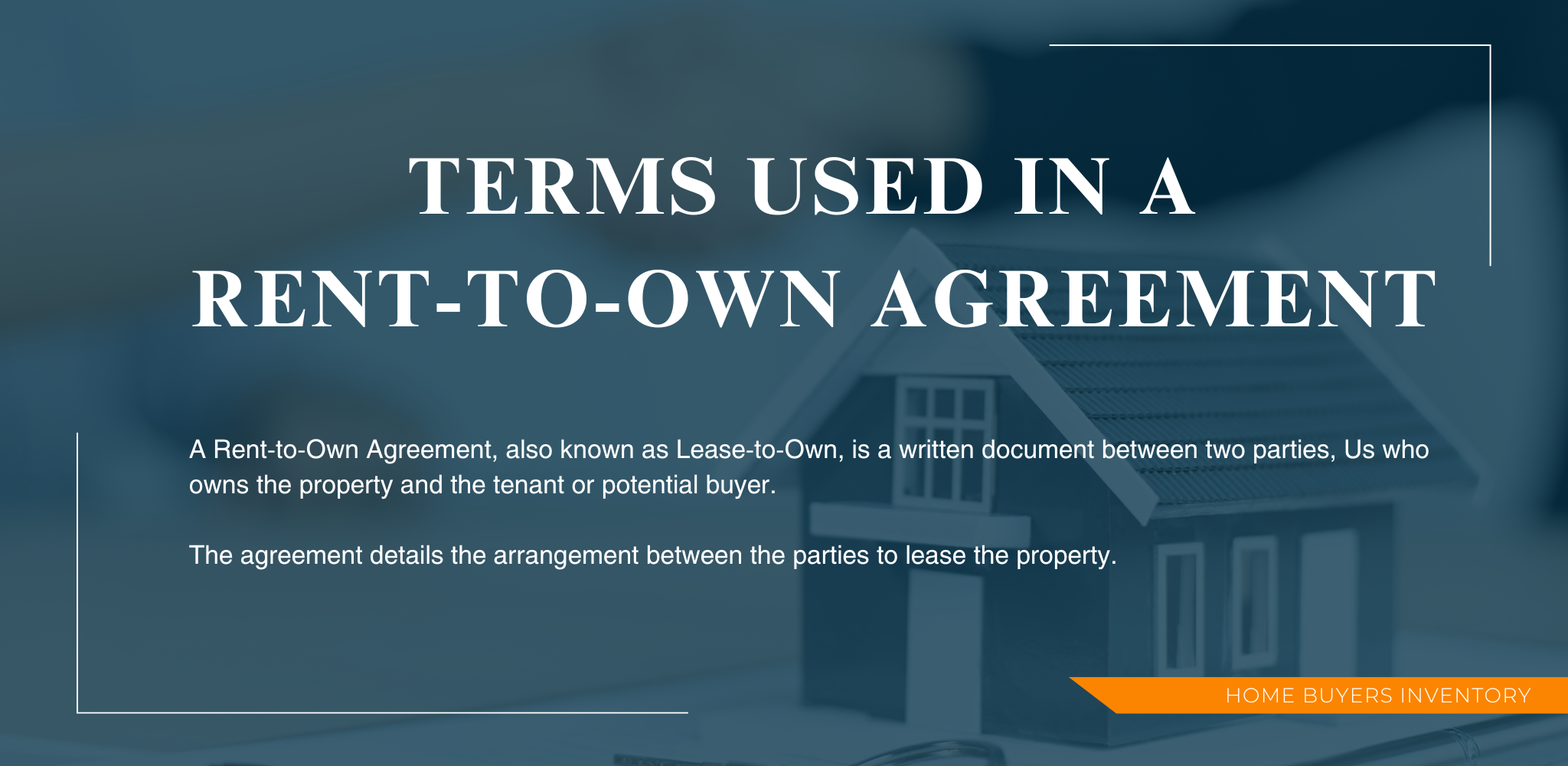
What are the terms used in a Rent-to-Own Agreement?
A Rent-to-Own Agreement, also known as Lease-to-Own, is a written document between two parties, Us who owns the property and the tenant or potential buyer.
The agreement details the arrangement between the parties to lease the property, while also granting the tenant the option to purchase the property at the end of the lease term.
Here are some Details that is included in a rent to own agreement:
-
-
- Seller/Us: The name and address of the party who owns the property.
- Tenant/Buyer: The name and address of the party who is leasing the property and obtaining the option to purchase.
- Property: The address and legal description of the property.
- Rent Payments: The amount of the monthly rent payments and any late fees.
- Rent Term: The beginning and end dates of the lease term.
- Option to Purchase: A specific grant to the tenant of an option to purchase the property.
- Purchase Price: The purchase price the tenant will have to pay if he or she purchases the property.
- Lease Option fee: The amount the tenant is paying for the option showing the tenant’s good faith intention to purchase the property. This allows the tenant to have a purchase price reflecting today’s value of the home, however they don’t have to purchase the home until between 1 year and the end of their guaranteed term. This is a huge advantage giving the tenant the time they need.
-
-
-
- Use of the Property: How the tenant can use the property.
-
-
-
- Condition of the Property: What condition of the property is in and the responsibilities of who takes care of the home
- Holdover Tenancy: What will happen if the tenant stays on the property past the lease term?
- Utilities: Who’s responsible for utilities.
- Maintenance and Repairs: Who is responsible for maintenance and repairs.
- Alterations: Statement of permission for tenant to make alterations and improvements to the property.
- Smoking: Policies on smoking
- Pets: Pet policy, and expectations if you have pets.
- Rules and Regulations: Rules and regulations that are expected to be followed.
- Subleasing: Subleasing terms
- Renter’s Insurance: Renters Insurance requirements and how to have the insurance written.
- Damage to the Property: What happens if the tenant damages the property.
- Surrender of the Property: What happens at the end of the lease term if the tenant does not exercise the option to purchase.
- Default: What happens if the tenant defaults.
-
Other details about the purchase:
-
-
- Property Included in Sale: What personal property and fixtures are included with the sale.
- Exclusivity of Option: Statement of purchase, which is exclusive to the tenant.
- Inspection: Buyer is purchasing the property “as is”.
- Closing: When will the closing occur
- Closing Costs: Who pays what closing costs
- Title Insurance: Who is responsible for obtaining title insurance.
- Financing: Tenant should seek financing to cover the purchase price.
- Real Estate Taxes: Who is responsible for real estate taxes.
- Existing Mortgages: Seller has to pay off any existing mortgages.
- No Equitable Ownership: Rental payments do not give the tenant any title interest in the property.
-
Other details:
-
-
- Disclosures: Included such as such as lead paint, mold and/or sex offender registry disclosures.
- Notices: Note where notices regarding the agreement should be sent to the landlord and tenant.
- Binding Effect: Note that the agreement will be binding on the parties and their heirs
- Amendments: State how amendments to the agreement can be made.
- Disputes: Include how disputes will be resolved – by mediation, arbitration, litigation, or a combination.
- Entire Agreement: Affirm that the agreement is the entire agreement and supersedes all other agreements.
-
Now that we have an idea on what is the content of a rent-to-own agreement, it will be easy for a potential buyer to understand when purchasing a home.
Here at Homebuyers Inventory, we make sure that you as potential homeowner understand all the content and should know your rights and obligations before signing the agreement. If you have further queries about the contract we will be pleased to assist you, whatever your needs are.